When Google announced that it was improving featured snippets with MUM, some of the language involved in the consensus negotiations reminded me of the things described in the Search Quality Assessment Guide (also known as the Quality Assessment Guide or QRG).
Although QRG is not an exact copy of Google's algorithms, it does give us a lot of clues as to what Google is trying to achieve. Google recommends reading the results guide:
“Understanding how reviewers learn to appreciate good content can help you improve your content. In return, you can do better in your research.”
Google, "What Website Owners Need to Know About Google's Big Updates"We manage to help sites improve by evaluating them in the same way as quality. Highly recommended to study!
This article will discuss:
In a Google blog post, they told us that they are making changes to what they call "exclamations". This is the part shown in bold and larger and is basically the answer to the questioner's question.
In the example above, if the search engine asks "How long does it take for light from the sun to reach the Earth?" The exclamation point for the part shown will be "8 and 1/3 minute."
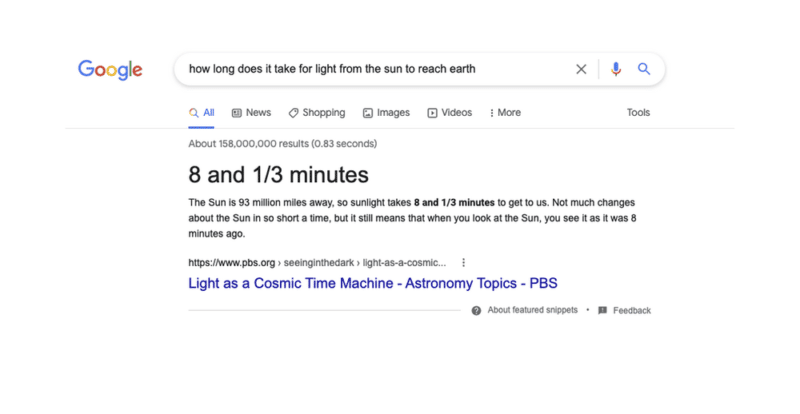
They tell us that these calls will be checked "with other high-quality sources on the Internet to see if there is general consensus on this revision, even if the sources use different words or concepts to describe the same thing."
At the time of this writing, if you did this research, there was no part of the exclamation point yet, but you can clearly see that there is consensus on this answer on the higher rated sites.


Although the results use a slightly different formulation - for example, 499 seconds is the same as 8 1/3 minutes - they all agree that this is a real fact. Perhaps Google is comfortable that this answer is correct, and thus can feel safe viewing it as a separate salutation snippet.
Google says it "found that this consensus-based approach significantly improved the quality and usability of featured snippets."
With this difference, it's probably more important to align with consensus (i.e. what the highest quality sources say) when it comes to ranking snippets, especially for "simple" questions where the slider looks for specific and concise information. Answer.
If your content goes against what authority sites in your industry are saying, Google probably won't want your answer to be shown as a featured snippet.
Google doesn't say matching is a ranking factor at this point, except that it's taken into account when processing feature snippets. Since there is a lot of information in the QRG to guide reviewers in determining whether content is against consensus, I think it is reasonable to assume that agreement with consensus is important for YMYL subjects.
When the topic of consensus appears in SEO circles, it sparks controversy.
Does the fact that a group of people agree on something make it true?
It's important to note that Google doesn't just look at any website to determine if there is consensus on an answer. They are not looking for the most popular answer on the web. Rather, they say they seek consensus from "several high-quality sources on the Internet". (Google's blog post on what website owners need to know about major updates tells us more about what they consider a high-quality site.
Does this mean that any article that collides with the highest-ranking pages in a YMYL topic has no chance of ranking at all in Google? I think Google might have a solution for this, which I will address shortly.
What does QRG say about consensus negotiationsWhen reviewers are trained to rate content, some sites in the QRG ask them to determine if the content on a page aligns with expert consensus. This wording has been in the QRG for some time.
For YMYL topics, Google tells reviewers that this is a sign of high quality when the content aligns with expert consensus, and low quality when it isn't.
For content to be considered high-quality by reviewers, it must be "factually accurate on the topic and backed by expert consensus, if such consensus exists."

For news articles or information pages on scientific topics to be considered of high quality by the rater, they must "reflect the established scientific consensus where such consensus exists."

Again, for YMYL topics, reviewers are asked to rate whether the site follows medical, scientific, or even historical consensus.

In the latest QRG update, Google emphasized in several places that YMYL content should be judged based on whether a topic or misinformation about a topic is likely to cause harm. "Health-related advice that conflicts with established expert consensus and may cause serious harm" should receive a "Lower" rating from reviewers.


Coordination with expert opinion is important for sites that want to rank on Google with content focused on YMYL (your money or your life) topics.
Examples of sites that do not follow consensusQRG gives us some examples of content that should be rated as low quality by reviewers because it does not meet expert or scientific consensus. Here are some.
1. A site that promotes "pro-ana" or "pro-anorexia" as a lifestyle.
This site promotes anorexia as a lifestyle and is against most doctors' recommendations. Doctors consider anorexia to be an eating disorder and a mental illness.
If you read the content on the site, some of it is not bad. There are some relatively good tips for losing weight along with potentially harmful tips for drastically reducing your daily caloric intake.
What do "quality sites" say about this topic? No matter what I searched for, the top-rated site said Proana was not safe.


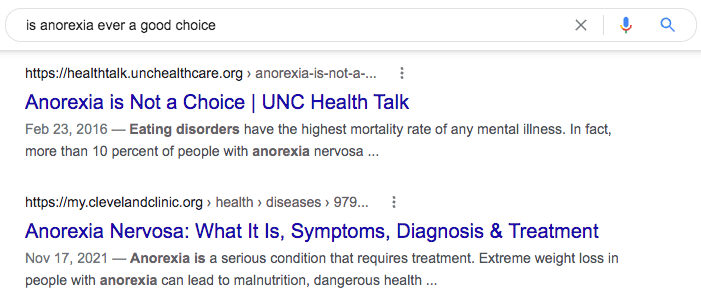
Google is unlikely to rank this page because it contains recommendations that go against the general opinion of doctors and can also cause serious harm.
2. Stomach Flu page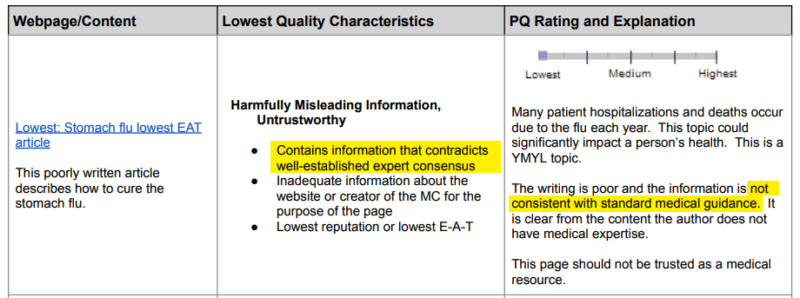
There are several reasons why reviewers claim to rate this site as "inferior" in quality. This is an article that provides medical advice, but there is no evidence of medical eating.
Reviewers aren't told exactly which parts of this article conflict with expert consensus, and frankly, most of the advice in this article appears to be in line with expert recommendations. The only mistake I've found is that the content recommends not eating as the Mayo Clinic recommends that people with the flu try to eat certain easily digestible foods.
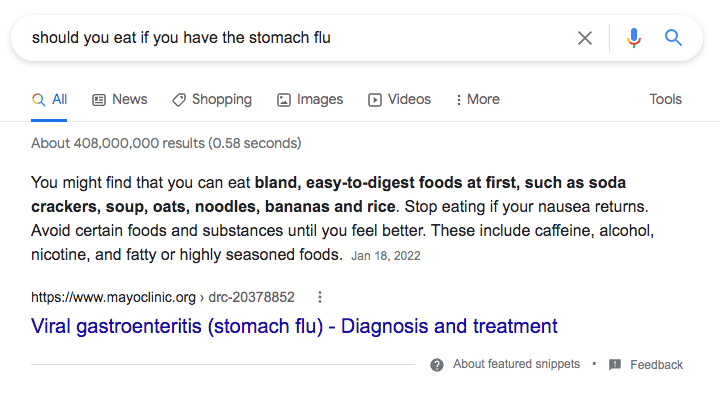
I think the biggest problem with this content is that it gives medical advice despite the lack of medical food intake. However, it is interesting to see that the reviewers have been told that this is against the scientific consensus.
3. Flat Earth Society
It's interesting. The site contains content that goes against the conventional wisdom of scientists that the Earth is round.
Google for sure here:
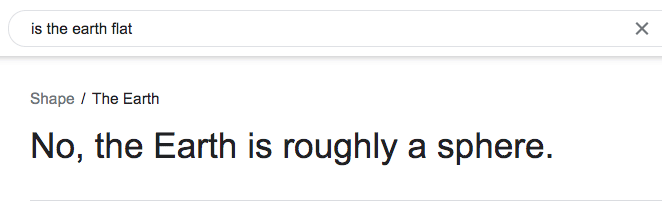
While you and I probably agree that the idea that the Earth is flat is just plain stupid, there are a lot of people who actually believe it. But Google does not want to share this information with search engines because it clearly goes against the scientific consensus.
Although it should?
What if people clearly seek information that goes against the general consensus?QRG has a rule that states that in order for medical or scientific sites to be evaluated as meeting a user's needs, their content must reflect "the established scientific/medical consensus, unless the user explicitly requests an alternative view". (I added bold type by me.)

What bothers me is that this does not yet apply to many queries in Google search.
Based on the example above, I was looking for [Is the Earth flat]. I was curious to read the point of view of the people who believed in this belief - I wanted to understand why they believed it and to hear it from their point of view.
I've tried many searches - [Explain Why the Earth is Flat], [Why the Earth is Flat - Flat Earth Perspective] or [Prove that the Earth is Flat]. It is clear that these elements are present. People love to write about their theories!
But even though I was clearly looking for an alternative view, Google only turned up articles telling me why the Earth isn't flat and anyone who says it is wrong. My goal as a researcher has been to read information that goes against the scientific consensus.
Who is Google to decide that I can't search and find alternative views online? Is Google acting like an overprotective mother deciding what content is safe to read?
I think it's possible that "Expanding Google's Information Gap Content Guidelines" as described in their announcement is the first step towards solving this problem.
Recommendations to bridge the information gapsGoogle is already offering content recommendations as news of a critical story is quickly discovered online. They can display a message to search engines that says, "These results seem to be changing rapidly. If this topic is new, it may take some time to add results from trusted sources."
In a recent Google blog post, they told us that they're extending this advice beyond breaking news.

In the example provided by Google, the search was [How to contact Illuminati]. I did this research and actually got one of these warnings:

Although there is a historical group called the Illuminati, the general consensus today when they are mentioned is that much of the information discussed falls under the category of unsubstantiated conspiracy theory.
Again, is Google responsible for protecting me from misleading or potentially harmful information online? What if I am legitimately doing research and want to read information that supports this conspiracy theory?
After warning that Google may not have reliable information on this topic, it shows several sites that I can read to learn more about it.
I think, although it's not yet clear, that this instructive warning is Google's response when it comes to people who clearly want to see results from a non-intuitive or potentially unsafe perspective. They can now provide websites to search engines that offer an alternative view, even if there are concerns that the content may be misleading or harmful.
I've found it to be really good for many alternative medicine sites! These content rules may allow Google to display sites that discuss treatments that conflict with scientific consensus, as long as it is clear that this is what the user is looking for.
Understanding food intake is very importantI was pleased to see that Google highlighted in this blog post the importance of understanding the concept of EAT (Experience, Authority and Credibility).

Google wants to show results from reliable sources.
In their latest blog post, they revealed that they are expanding the "About This Finding" feature to help researchers learn more about the company their website is browsing.

All this is very similar to EAT as described in the QRG.

The QRG is full of information that will help us understand the meaning of the concept of EAT. Every time I read it, I get more tips that can help us improve our eating.
This recently published Google document titled "Recommendations for Research Quality Evaluators: An Overview" gives a very good idea of how raters rate E-AT:
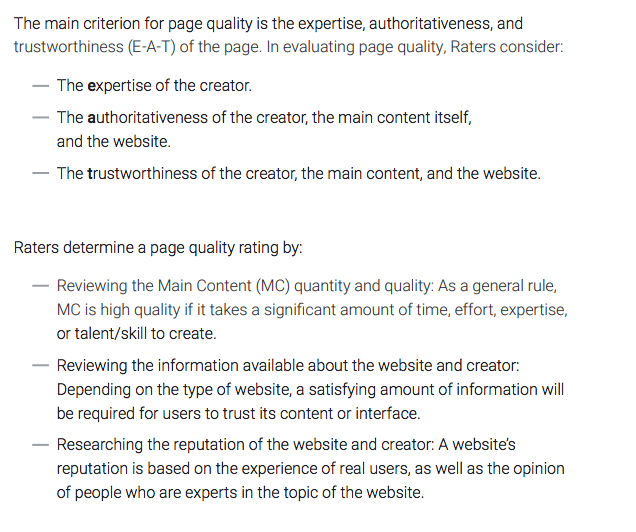
EAT is much more than just adding an author bio. For some content, an author bio may not be necessary or even helpful!
EAT includes content that requires time, effort, experience, or talent/skills to create.
If you are writing on topics that the researcher expects to see an answer written by an expert, it is important to establish that the article was written by someone with experience, or perhaps known as a company with expertise in the field.
Having a reputation for knowing your topic is an important part of EAT.
Consensus: What SEOs Can Learn From GoogleIn this article, we talked a lot about the importance of maintaining consensus, especially when writing articles on YMYL topics. I'd like to reiterate that Google's blog post talked about using consensus among high-quality websites as a component to help them build better features.
They did not assert that consensus is the ranking factor when it comes to organic search ranking.
However, given the strong focus on consensus negotiation in QRG, I think it is reasonable to assume that if we want to rank YMYL content in Google, consensus negotiation is what we should aim for.
Perhaps, this is one of the components of reliability, the letter T in EAT.
My advice:
The opinions expressed in this article are those of the guest author and not necessarily those of the search engine. The writers' crew is listed here.
new to search engine
About the author
Dr. Mary Hines is totally obsessed with trying to understand how Google evaluates quality and then helping companies improve their websites. Her growing company, Marie Haynes Consulting Inc. Specializes in website quality reviews and link checking. You can contact their team or sign up for their newsletter, which keeps the SEO world updated with the latest changes and search tips.
Post a Comment
Post a Comment